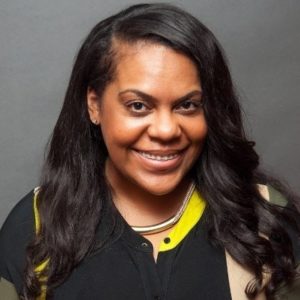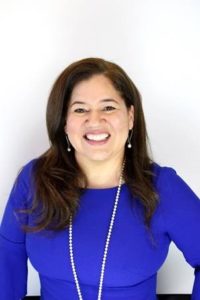Leading a nonprofit is not for the faint of heart. As Vickie Lakes-Battle, IFF’s Executive Director of the Chicago Region, says, “A huge range of issues come up – and a lot of them have little or nothing to do with leaders’ programmatic backgrounds and expertise. Maybe the government funding you’re counting on is held up. Maybe your building needs an emergency repair. Where do you turn?”
Christa Hamilton, Executive Director of the Centers for New Horizons, can relate. So can Caroline Older, Executive Director of the Chicago Artists Coalition (CAC), and Katya Nuques, Executive Director of Enlace.
All three have successfully guided their Chicago-based nonprofits through the kinds of financial challenges that can, as Older puts it, “sink an organization, especially if you don’t have an endowment, don’t have access to a bank loan, and don’t have that angel investor who’s going to swoop in and save the day.”
These leaders have all participated in IFF-administered programs designed to help nonprofits advance their missions through capital, financial know-how, and a deeper network of peers, mentors, and allies to turn to when new challenges and tough decisions surface.
IFF recently caught up with Hamilton, Older, and Nuques. Here are their top program takeaways, in their own words.
Christa Hamilton, Executive Director, Centers for New Horizons
 Hamilton first worked with IFF to refinance the mortgage on the Centers for New Horizon’s main building, a move that freed up significant capital for its early childhood education, workforce development, and youth programs in Bronzeville, North Lawndale, Riverdale, and other Chicago communities.
Hamilton first worked with IFF to refinance the mortgage on the Centers for New Horizon’s main building, a move that freed up significant capital for its early childhood education, workforce development, and youth programs in Bronzeville, North Lawndale, Riverdale, and other Chicago communities.
She then joined the JPMorgan Chase-funded Stronger Nonprofits Initiative (SNI), which IFF and Fiscal Management Associates (FMA) administer for Chicago nonprofits led by people of color and/or serving communities of color. Hamilton participated in a series of workshops on financial management and received one-on-one coaching and expert assessments on how best to maintain and improve her organization’s facilities.
IFF: How did things change for you after refinancing your mortgage with IFF?
Hamilton: When I started as Executive Director, we were paying $20,000 a month for our mortgage. It’s down to about $9,000 now. Having that cash flow released was a huge pressure taken off. I feel more comfortable that we can take care of the families in need in our communities, as well as the employees relying on us to be fiscally stable.
IFF: What was the real estate consulting process like?
Hamilton: It was amazing. IFF came out and went through all of our buildings, some of which we’d been in for 47 years without any repairs or renovations. It gave me and my board of directors a clear understanding of what to focus on – from immediate concerns we were unaware of like electrical issues and code changes, to longer-term projects like the $5 million renovation we’re planning for a piece of property donated to us to help protect women and children.
The team didn’t just dump a number on my desk and say, “Good luck.” They came with ideas on how we would get there through different loans, resources, and programs – we had a chance to brainstorm together and document a feasible work plan.
IFF: What’s changed for you as a result of participating in SNI’s financial management trainings and one-on-one coaching?
Hamilton: There are several things I got out of it. One was connections with other nonprofit partners doing the same kinds of work. I hadn’t known some of them before or was only vaguely familiar with them. Now, I can definitely call on those people for support or assistance.
I was also very excited about the trainings because I’d been challenging myself to become closer and more connected to our financials. Without money, there’s no mission. But I’m not necessarily a finance person. I knew the basics but had been relying on my director of finance to translate things like liquidity ratios and the balance sheet in laymen’s terms. It was important for me as the executive director to fill in those gaps.
The deeper dive we took into our fiscal management system also opened the eyes of some of my staff who attended the trainings with me. They learned how money flows through the organization. And we realized we needed to get a new accounting system – something we’re working on the funding for now.
The coach from Fiscal Management Associates helped us change how we rolled out our budgeting process. We were almost doing it backwards before the coaching: coming up with the budget at the finance director level and then funneling it down to the program level. Now we start at the program level and feed that up into the budget. We’ve gotten the program staff directly involved, so they understand why some expenses are a ‘no’ and are able to influence the budget in ways that are specific to their needs. The team loves it.
IFF: What does the future look like for Centers for New Horizons?
Hamilton: I’m excited – and grateful that I had the opportunity to do a deep dive into our fiscal management. We have a long-term financial vision now. We aren’t just living day to day.
We’re approaching our 50th anniversary – and we’re growing beyond our Bronzeville roots, becoming a city-wide organization that’s able to serve more people. When I became Executive Director about five years ago, we had 150 employees and an $8.5 million budget, and now we’re up to 250 employees and a $14.5 million budget. We’ve been able to create more jobs and leaders.
We’ve also stretched ourselves to take on some violence prevention work that our community needs, becoming a trauma-informed organization. We’re helping people through counseling, we’re helping people get work who have been impacted by violence, we’re providing programming for kids to stop them from gang activities.
We’re excited to be doing our part to rebuild Chicago and save lives. And I feel more prepared and equipped to ensure we have a plan that’s going to keep us open from year to year.
Caroline Older, Executive Director, Chicago Artists Coalition
 The Chicago Artists Coalition helps ensure that artists have the tools and community to live, work, and thrive in Chicago. It’s a mission that requires a special building – one that can accommodate a classroom for professional development, studios for artist residency programs, and gallery spaces. So, when the organization needed to relocate, Older turned to the IFF-administered MacArthur Arts & Culture Loan Fund for assistance.
The Chicago Artists Coalition helps ensure that artists have the tools and community to live, work, and thrive in Chicago. It’s a mission that requires a special building – one that can accommodate a classroom for professional development, studios for artist residency programs, and gallery spaces. So, when the organization needed to relocate, Older turned to the IFF-administered MacArthur Arts & Culture Loan Fund for assistance.
In addition to capital, Older and her team received four months of intensive financial training and coaching from program partner Fiscal Management Associates.
IFF: Why did the Artists Coalition need to move – and what role did the MacArthur-backed loan play in securing your new building?
Older: A move can sink an organization, especially if you don’t have an endowment, you don’t have access to a bank loan, and you don’t have that angel investor who’s going to swoop in and save the day. So, when our previous landlord in the West Loop sold the building we were in, I knew we’d need to launch a capital campaign. We needed $500,000 to pay for the move and build-out at our new location in the Kinzie Industrial Corridor.
The biggest challenge was the timing. Our capital campaign was going on the same year we had to move, so the loan was absolutely critical. It enabled us to put our cash reserves toward the build-out, and then it smoothed out our operations during the campaign.
It was also important for our organization to simply go through the steps involved in being a responsible borrower: here’s how you take out a loan, prove you can pay it back, and follow through. Nonprofits are still businesses.
IFF: What have you found most useful from the financial training that you and your team received from FMA?
Older: The fact that we used our own organization’s financials made the training 100% relevant. Finance classes are often abstract – you’re not working with real data. And by requiring our board treasurer to be there with me and our director of development, we left as an even stronger team.
It really changed how we thought about presenting our finances to our board – how to make them an easier picture to absorb. It also helped me work on cash flow projections and multi-year financial planning. I came out thinking three years ahead financially versus just one year.
IFF: Why do you think the MacArthur Arts & Culture Loan Fund’s programs to sustain organizations like yours are important?
Older: I am a huge fan of the MacArthur Foundation and IFF. Receiving their support was, for a smaller organization facing a move, an incredibly important gift.
Smaller arts organizations like ours help ensure that people have multiple ways to engage with Chicago. Yes, you can go to Michigan Avenue. But you can also go to our neighborhoods to hear jazz in a nightclub, or to see art outside of what’s in the big institutions. That’s what drives us – that idea of keeping the city vibrant and feeding it from the ground up.
Katya Nuques, Executive Director, Enlace
 Enlace has become a significant part of Chicago’s Little Village neighborhood, offering a range of community development programs – from local gardens that promote healthy food access, to immigration and legal services, to housing assistance. Along the way, the organization has grown dramatically. In 2014, Nuques and her staff secured a $2 million grant from the State of Illinois to build a new headquarters. IFF, through a Polk Bros. Foundation-funded program called Smarter Spaces, stepped in to advise Enlace on selecting a promising Little Village location and planning for the building’s design and construction.
Enlace has become a significant part of Chicago’s Little Village neighborhood, offering a range of community development programs – from local gardens that promote healthy food access, to immigration and legal services, to housing assistance. Along the way, the organization has grown dramatically. In 2014, Nuques and her staff secured a $2 million grant from the State of Illinois to build a new headquarters. IFF, through a Polk Bros. Foundation-funded program called Smarter Spaces, stepped in to advise Enlace on selecting a promising Little Village location and planning for the building’s design and construction.
Then, the state’s extended spending freeze delayed Enlace’s grant payouts. Unsure when the grant would materialize, Nuques sought additional funding sources and extended Enlace’s partnership with IFF to oversee construction. The organization broke ground on its new facility in 2017 and is slowly but surely phasing the project toward completion.
IFF: Why is the new facility so important to Enlace’s future?
Nuques: Getting more space is going to be amazing for staff morale, and our new facility’s design really captures the essence of our community.
We’ve been in the same small building for the whole 20 years that the organization has existed, and in that time we’ve grown from just a few people to more than 200. We just don’t fit anymore.
In terms of program needs, it takes private office space to provide a lot of the services that we offer – like health care, legal services, and housing counseling – in a dignified manner. Unfortunately, it’s been a struggle. We’ve had to use places like schools and the public library. It’s pretty difficult managing the logistics of using somebody else’s space all the time.
IFF: How have the Polk Bros. Foundation and IFF helped?
Nuques: It’s hard to figure out what kind of space you might need – and how to build it – when you’re also trying to serve your community. The assessment services that we received through the Polk Bros. Foundation and IFF were the perfect match for us.
We were also wise to bring in outside help and hire IFF as our owner’s representative. We just don’t have the background to oversee a construction project. And one of the biggest benefits has been IFF’s expertise in multiple areas – having knowledge of the technicalities of government grants and how to work with elected officials. When you tell other organizations and agencies, ‘We work with IFF,’ they take your project seriously. That reputation and relationship piece has added a lot of value.